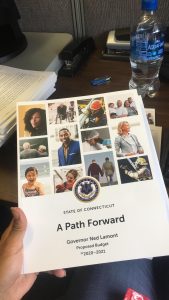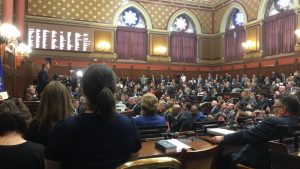The fight for an effective and equitable educational experience has been decades in the making and continues to go on today. School choice advocates have been in search of alternatives to the traditional neighborhood public school, which has long been the only option for poor black and brown students. Within the last few decades, charter schools have emerged as a new and exciting way of experiencing school, particularly for those students who have historically been left out of school choice initiatives. The Uncommon Schools charter school network, an emerging school network that opened in 2005, is one of the new, alternative school networks promising students a high quality education and a sure entrance to college. First opening in Newark and now expanding across New England, Uncommon Schools boast about providing a high quality education to underprivileged students in urban areas. Their mission statement states that Uncommon schools “are joyful and rigorous” and “full of love and learning”, rhetoric used to lure students into the program. However, students who have been through these schools do not always share these feelings (Homepage). As an alumni myself, I empathize with those who have not experienced the network’s stated mission in the terms they describe. Their impressive 99% success rate of getting students to college is attractive and well-earned, but student sentiment often makes me question whether these results are worth the costs to students. How did advocates of the Uncommon Schools charter school network envision their mission when they began in 2005, and how have different students experienced this reform since this time?
The Uncommon Schools network is genuine in their efforts to provide an alternative and successful schooling experience for marginalized students, and this can be seen both in their mission statement and as reflected in their results. However, it would be wrong to not acknowledge the negative views and experiences many students hold of the network. Like various other charter schools, Uncommon maintains a hard-line, zero-tolerance policy as a framework for discipline, though they would not describe themselves in that way. These types of policies force students to conform and perform in restrictive ways that often lead to students feeling resentful of their school, regardless of its success or amenities. While the Uncommon Schools network’s website states that its intent is to provide a high-quality, college-bound education that fosters a love of learning among students, in practice, it can often do the exact opposite, as students have reported to feel demeaned, ashamed, and resentful of their Uncommon institution. Although the success of Uncommon Schools is impressive and should be acknowledged, it is negligent to give praise to the network without also voicing at what costs to the students these results derive from.
From 5th to 12th grade, I attended Uncommon Schools and experienced first-hand what it is like to attend their charter schools. While they were helpful in a myriad of ways and did ultimately help lead me down a path to college, I cannot help but feel spiteful by the way me and my fellow students were treated sometimes. In many ways, families and students alike were convinced that the tactics used by the network were what made the students successful, and that they were a “necessary evil” in order to best be prepared for college and beyond. But now, as a junior in college, and after reflecting on my own schooling experiences and those of my peers, I am realizing how hurtful, arguably traumatic, the rules and regulations of the Uncommon schools actually were. Even when intentions are well, the experiences of students are a true reflection of the outcome of such policies. As much as this is a personal narrative of my time navigating through the Uncommon school system, it is also a scholarly work examining the underlying tactics used by no excuse charter schools such as Uncommon.
Uncommon Schools was first realized with the creation of North Star Academy Charter School In 1997, located in Newark, New Jersey. As it quickly became a successful school for neighborhood students, Uncommon Schools officially became a charter management organization focused on helping low-income students of color in 2005. Since then, they have expanded to own and operate 52 schools in New England, with most schools located in New York (About Us). Overtime, while their stated mission has sounded pragmatic and beneficial to students, the student experience has not lived up to its ideals.
As mentioned, Uncommon Schools is a non-profit organization that intentionally operates schools in urban, low-income areas. Joan Goodman, author, researcher and professor at UPenn, in her essay Charter Management Organizations and the Regulated Environment: Is It Worth the Price? describes these schools as charter management organizations (CMOs). CMOs like Uncommon are characterized by a highly rule-ordered and regulated environment, which is part of what begins to foster negative sentiment among students (89). During my time in the school, students had to follow a demerit and merit based system, a strict system aimed at controlling student behavior. Students received infractions for low-level incidents, such as picking up their pencil, for having an untucked uniform or for being in the bathroom for more than 5 minutes. Students were demanded to walk in straight, silent, single-file lines with their hands clasped to their sides, and learned to merely accept the rules rather than understand them, and to always be cognizant of adult expectations. Goodman describes these policies as following the broken windows theory, which claims that in order to avoid escalated sanctions or misdemeanors, schools must police the very small, harmless infractions (92). Many of the behaviors stated above, while not necessarily wrong or damaging to the student themselves or their peers, still require policing in so that students can avoid larger issues. (93). In doing so, students rightfully felt confined to a small and specific set of actions they could engage in. Sometimes, they would intentionally “test the waters”, or engage in activities unknown to their teachers, in hopes of expanding their limited set of acceptable actions. This still happens today and will continue to because high school students are young adults just beginning to navigate the world on their own. As restrictions grow, so will students attempt to challenge them.
To reiterate, the Uncommon Schools mission statement is very positive and hopeful in its outlook on the student experience. Under the Student Experience section on their website, It states that they “set high standards for character and academics, while creating joyful classrooms where students can discover new interests and develop their identities”. This idealistic description of the school network simply does not transfer over to the classroom. Students, who as discussed, often have to resist their instinctual emotions in the classroom or be faced with harsh consequences, often take to social media to express their frustrations. At Uncommon Charter High School, the high school I attended, a “Class of 2016” Facebook group page was created for students of the class to communicate and speak directly to each other about anything. Started in 2013, it was a space where we vented to each other privately to express mutual frustration about our schooling experience.
One student writes, “my dad asked me y I got a demerit I said b/c I was chewing gum. He said it seems like I don’t care. Then I thought to myself, I really don’t care”. Here, it is clear that this student has grown so tired of the rules at Uncommon that he has stopped trying to follow them. Another student shares similar sentiment when he writes “I get suspended every week”. In another post a few weeks later, the same student wrote “off punishment, feel like I’ve been living In a cave”. Posts like these shed some light on how students going through an Uncommon school described their experience, and from what I remember, this sentiment was shared by most students. During times when we were truly fed up, we organized. At one point, it is evident that students had had enough with the rules of the schools and were planning to make demands. One student wrote, and others shared and reposted:
“Given the recent changes made in UCHS this year we the movement of Student Voice ask you guys to join in helping to bring back remastery, better school lunches, improve the student teacher respect more by understanding students before handing out consequences, lengthen lunch periods to be used as more socializing time and for longer office hours or even more office hours in one lunch period. We Ask for each and everyone of you show your support by on Tuesday wearing a shirt that says “#studentvoice”, spread the word, tell your friends tell your parents let everyone know that we students of UCHS want better for our school because if we don’t stand up and demand these changes nothing will be done. So please show support this Tuesday.”
Messages like these prove that not only were students not experiencing the Uncommon mission as stated, but they were actively trying to change the tactics used to get there. In moments of deeply held and mutual vexation, students were adamant about changing the status quo. The quote “improve the teacher respect more by understanding students before handing out consequences” continues to be a constant theme among students and demonstrates the disconnect between the networks mission and the student experience.
While there are few documented sources of the negative views that students who attended an uncommon school held, the network has found themselves at the center of controversy in the news. A 2013 PIX 11 News article entitled “Students Treated like Prisoners? Parents Complain Charter School Goes Too Far with New Disciplinary Program” exposes some of the hard-line disciplinary actions that are commonplace at these charter schools. It discusses Excellence Boys Charter School, a Kindergarten through 8th grade all boys Uncommon charter school and a new policy they implemented at the school. In a memo to parents about these new changes, the school explained that they, “would allow students to earn—or lose—achievement points, based on their behavior. Starting each school week with 50 points, any student left with 0 or less points by week’s end would be subject to five days of detention–and designated ‘Out of the Brotherhood’. This means they would be placed in a separate room for breakfast and lunch—and ordered to wear a light green Polo shirt, instead of the blue Oxford shirt boys in the Middle Academy typically wear as part of their uniform. Other scholars, as the school refers to students, would not be able to interact with the disciplined boys.”This form of designation, a sort of a playbook out of The Scarlet Letter, demonstrates a growing rift between what the network’s mission states and what the students are experiencing. To be deemed “Out of the Brotherhood” at an all boys, majority black school is disrespectful at the least and is clearly damaging to the student. One parent who was asked what they thought about the new policy says “It doesn’t promote excellence. What it promotes are feelings of inferiority….feelings of shame. What about the focus on academic points in Math and Science?” Another parent added, “If the end result is making a child feel like an outcast, that I don’t agree with. Making that child an outcast could make that boy withdraw from the other students.”
Even with the concerns, the school vehemently defended its policies. Samantha Tweedy, head of the school said that, “The lion’s share of those adjustments have been incredibly well received by the school community,” she continued. “What we’re doing here is about getting our kids to college.”
The college argument is by far what frustrated students the most. Since none of us had experienced college before, we entrusted our teachers with showing us how college was like, and often dealt with these policies assuming they would be reminiscent of college life. But as we navigate college now, we are left to wonder: where is the no gum policy? Where is the bathroom rule? While obviously rhetorical, the idea that restrictive and harsh policies are what prepare students for college is counter intuitive. At college, students are generally free to do what they want. Their is a newfound freedom that comes with being able to choose your courses, what clubs you get involved in, and however else one decides to include in their college career. Micromanaging students is such a way is not only not reflective of the realities of college, but it can detrimental to students who are used to be told what to do all the time.
The Uncommon Schools charter school network officially began in 2005 with the goal of getting low-income, students of color to and through college. The networks mission, while admirable, is not what students are actually experiencing in the classroom. During their time in the network, students are required to perform in restrictive ways in order to succeed and avoid getting into trouble. This is on account of zero-tolerance policies and as noted by Goodman, the theory of broken windows. Between these two methods of discipline and many other arbitrary tactics, Uncommon’s success is marred by the reality of the true student experience. As an alumni, I wanted to be able to recount my time at the network and relay the experiences of my peers as honest and sincere as possible. While I will forever be appreciative of my education and of the opportunities that were afforded to me at Uncommon, I will never be able to forget the unnecessary hard-line rules that I had no choice but to endure.
Works Cited
Goodman, J. F. (2013). Charter Management Organizations and the Regulated Environment: Is It Worth the Price? Educational Researcher, 42(2), 89–96. https://doi.org/10.3102/0013189X12470856
“Homepage.” Uncommon Schools, uncommonschools.org/.
“Students Treated like Prisoners? Parents Complain Charter School Goes Too Far with New Disciplinary Program.” WPIX 11 New York, 30 Jan. 2013, pix11.com/2013/01/29/students-treated-like-prisoners-parents-complain-charter-school-goes-too-far-with-new-disciplinary-program/.
“The Student Experience.” Uncommon Schools, uncommonschools.org/the-student-experience/.
“UCHS Class of 2016.” Facebook, m.facebook.com/groups/267033636742802?ref=bookmarks.
“Uncommon Schools.” Wikipedia, Wikimedia Foundation, 19 June 2018, en.wikipedia.org/wiki/Uncommon_Schools.




